Paris Blu-ray Movie
HomeParis Blu-ray Movie 
MPI Media Group | 2008 | 130 min | Not rated | Mar 16, 2010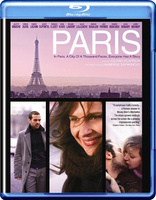
Movie rating
6.5 | / 10 |
Blu-ray rating
| Users | 0.0 | |
| Reviewer | 3.0 | |
| Overall | 3.0 |
Overview
Paris (2008)
The story begins with Pierre, a young man unexpectedly confronted with his own mortality. For the next 24 hours, his tour through the city will weave with those of his beloved sister, his neighbours (some known, some not), their friends and workmates, and their interconnected stories of love, familial bonds, loneliness and compassion come together in unexpected ways.
Starring: Juliette Binoche, Romain Duris, Fabrice Luchini, Albert Dupontel, François CluzetDirector: Cedric Klapisch
| Drama | Uncertain |
| Foreign | Uncertain |
| Romance | Uncertain |
| Comedy | Uncertain |
Specifications
Video
Video codec: MPEG-4 AVC
Video resolution: 1080p
Aspect ratio: 2.34:1
Original aspect ratio: 2.39:1
Audio
French: DTS-HD Master Audio 5.1
French: Dolby Digital 2.0
Subtitles
English, English SDH, French
Discs
50GB Blu-ray Disc
Single disc (1 BD)
Playback
Region A, C (locked)
Review
Rating summary
| Movie | 3.0 | |
| Video | 3.5 | |
| Audio | 4.0 | |
| Extras | 3.0 | |
| Overall | 3.0 |
Paris Blu-ray Movie Review
“Passionate Paris. Party Paris. Singing Paris. Heartfelt Paris. But also working Paris. Commuting Paris. Ritzy, shabby, trashy Paris. Paris, you have a thousand faces. Paris, who are you?”
Reviewed by Casey Broadwater March 21, 2010Best known in the U.S. for his youthful euro-pudding rom-coms, L'auberge espagnole (The Spanish Apartment) and its sequel, Les poupées Russes (Russian Dolls), Gallic director Cédric Klapisch’s latest film, Paris, is a grown-up affair, its romance tinged by death and desperation, the comedy less of hormonally charged exuberance and more of manners and social awkwardness. It’s not so much a love letter to—and from—the City of Light as it is a celluloid essay on the lives, losses, norms, and values of a stratified French society. An essay, it should be said, that’s enjoyable, but somewhat overambitious and overlong. Featuring one of Klapisch’s characteristically large, Altman-esque ensemble casts, Paris is subject to a detrimental amount of cinematic urban sprawl, spreading out in all directions like the city itself as it tries to follow a few too many characters.
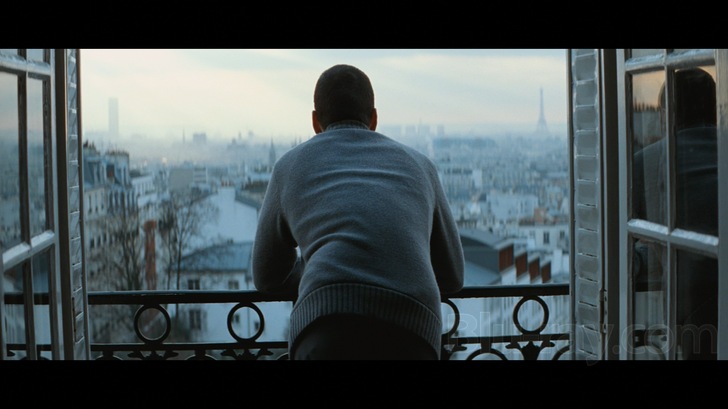
"They don't know how lucky they are..."
The plot’s central figure, played with intelligent effeteness by Klapisch mainstay Romain Duris, is Pierre, a cabaret dancer who has just been told that he desperately needs a heart transplant, and that he may have only a few months to live. With the possibility of death looming, Pierre grows alternately nostalgic and remorseful, calling up a junior high crush to reminisce about their first dance, and later wrestling with the fact that he may never make love again. Largely confined to his flat—just climbing a flight of stairs sends him gasping for breath—Pierre stands on the balcony, overlooking the city, and watches the denizens of the streets below, wondering who they are and where they go. “They become heroes in my little stories,” he tells his sister, Élise (Juliette Binoche), a social worker and single mother of three who has moved in to help take care of him, but Pierre’s admission might as well be Klapisch’s statement of intent for the entire film, which meanders in and out of more than a dozen Parisian lives.
From across the street, Pierre can spy into the window of Laetitia (Inglourious Basterds’ Mélanie Laurent), a student at the Sorbonne who is being secretly stalked by Roland Verneuil (Fabrice Luchini), a Parisian history professor in a mid-life funk. “An ancient city continually recreates its modernity out of the conflict between the old and the new,” says Roland in class, reflecting his own struggles to remain young and relevant. Klapische wrangles some painful comedy out of Roland’s crisis as the grey-haired prof first text messages Laetitia in laughable cyber shorthand—“U R awesome. I’m 2 hot 4 U”—and then resorts to lewd lines from Baudelaire, seemingly aware that his attempts to be hip are more than mildly ridiculous for a man of his age and stature. When Roland, fresh from a visit to the shrink, calls his architect brother Philippe (François Cluzet) “normal,” he means it as a compliment, enviously even, but Philippe—about to have a child and unsure of his own future—begins to question what normalcy means for a man.
But wait, there’s more. We also check in on a Cameroon immigrant, a mildly racist bakery owner and her North African help, a tracksuit and blazer-wearing bum, and a divorced fruit salesman whose ex still works in his stall and flirts with the salty fishmonger across the way. Some of the lives intersect, some don’t. Rather than trying to ape films like Magnolia and force coincidental connections, Klapische merely creates a cross-section of Parisian society and then watches as the various lives unfold, each character embroiled in the daily drama of existence— arguments and unlikely affairs, casual sex and existential anxieties. There’s no overarching plot, no heady, “big picture” pronouncements about the human condition, no sudden insights or caustic societal indictments, just these simple stories, which, taken together, form a panorama of life in Paris. Most of the major characters are wonderfully developed, and we’re pulled along by the voyeuristic desire to find out what happens to them. Roland, in particular, is a fully formed fictional creation, a bundle of neurosis who wants so desperately not to become an “old fossil” like his former thesis advisor that he sells out academically—by hosting a TV history series—and strikes up a May to December romance with one of his students, fully recognizing how cliché he must seem.
Unfortunately, it feels like Klapische struggled to structure his film in the editing room, as it runs on for far too long, yet still leaves several of the sub-plots—the immigrant’s journey to France and the fate of the homeless man, most noticeably—feeling conspicuously underdeveloped. I can understand that he wanted to present a full spectrum of Parisian society, not just the bourgeoisie, but Klapische’s to-the-trunk pruning of the poorer characters’ narrative branches begs the question of why he included them at all. (I could also live without Philippe’s architectural CGI nightmare, a totally unnecessary interlude.) Though Paris is incredibly longwinded— especially for a lightweight drama that doesn’t really have a whole lot to say—I enjoyed the film on a purely technical level, both for the beauty of cinematographer Christophe Beaucarne’s lensing, as well as the uniformly excellent performances. Juliette Binoche looks intentionally rumpled, but she’s just as beautiful and convincing as ever as she tends to Pierre with sisterly concern. And Romain Duris, who usually plays some sort of arrogant cad in Klapische’s previous films, shows a softer side here, noble in the face of death and rightfully earning our empathy. But top billing, for me anyway, should go to Fabrice Luchini, who shows subdued comic genius in his every self-serious expression, but totally lets loose while cutting the rug to the grand funk of Wilson Pickett’s “Land of 1,000 Dances.” You can call the French arrogant, but you can’t say they don’t know how to have a good time.
Paris Blu-ray Movie, Video Quality 
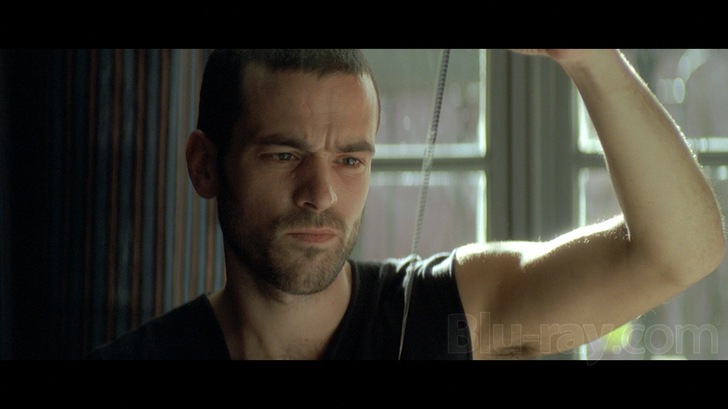
No, Paris wasn't shot on that strip of Super-8 that Pierre is examining above. The film makes it way from 35mm to Blu-ray via a 1080p/AVC-encoded transfer that, if not a shockingly revelatory high definition experience, is definitely easy on the eyes. The image is never blurry, but as a whole it is slightly soft, lacking the extreme fine detail—the individually discernable pores and whiskers and clothing fibers—that you might see in a glossier production. Still, it's a pleasing softness, well suited to the tone of the film, and complemented by a rich and untouched grain structure that swathes the image in cinematic warmth. More impressive is the use of subdued, realistic color to set a mood, from the almost mournful blue cast as Pierre scans Paris from his balcony, to the gilded halls of Baudelaire's Hashish Club, with skin tones that are consistently natural. Black levels are strong but never oppressive, and contrast is nicely balanced, giving the image sufficient presence and depth. Importantly, the picture is unmarred by compression artifacts, banding, ringing, blocking, or other corrupters.
Paris Blu-ray Movie, Audio Quality 
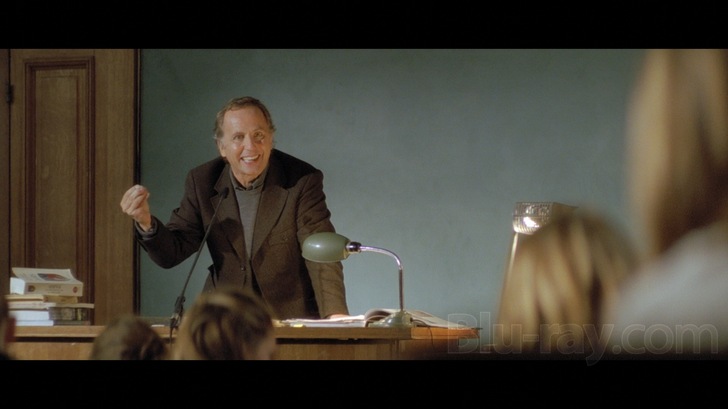
From what I knew about Paris—a quiet drama, the harbinger of a front-heavy, uninvolving audio experience—I wasn't expecting to be as impressed as I was by the French DTS-HD Master Audio 5.1 surround track included here. The film is definitely dialogue driven, but whereas many movies would be content to mix the voices to an appropriate level, toss in some quiet environmental noises, and leave it at that, Paris continually comes alive with immersive and realistic ambience. Nearly every scene feels accurate to what you might hear if you were there with the characters—street sounds drift up to Pierre's balcony, traffic coughs and putters through the rear channels, and the clangs and bangs of a construction crew fill out the site of the architect's latest project. It's never particularly loud or showy, but I was continually impressed by what I heard. Likewise, the film's music all sounds excellent, with depth and definition, from the wheezy French accordions and smoky jazz to downtempo chill-out and the LFE bass pulse of fashion runway dance tunes. The mix is clean, clear, and definitely more engaging than you might imagine. Do note that the subtitles appear in easy to read, bright yellow lettering.
Paris Blu-ray Movie, Special Features and Extras 
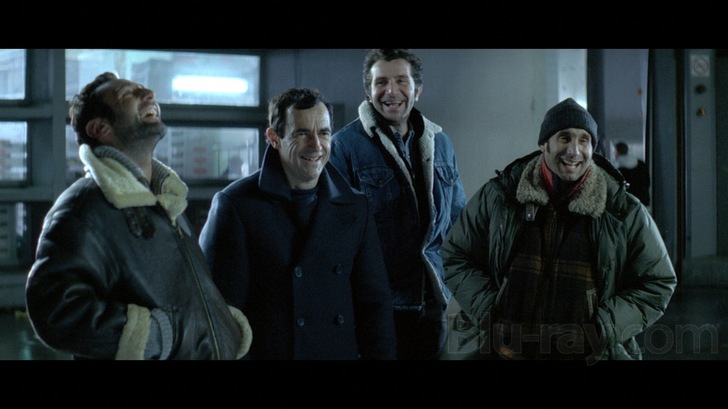
Behind the Scenes of Paris (SD, 50:48)
I love behind-the-scenes footage, but at 50 minutes, even I felt this production
documentary ran overlong, mostly because there's no discernible structure to it. It's just endless
B-roll footage, with no narration and few interviews with the cast or crew. Still, if you like
watching how films are made, this is a proper cornucopia.
The Music of Paris (SD, 7:24)
Here, the director Cédric Klapisch and composer Loic Dury discuss the concept of the score, while
some dude named Robert Chicken Burke—I'm not sure if Chicken is a nickname or not—lays
down some guitar tracks.
The Production Design of Paris (SD, 6:03)
Director Cédric Klapisch discusses how he didn't want to shoot everything on location, New Wave
style, but wanted to mix real places with studio constructions, explaining that having some
artifice in the sets allows the viewer to focus on the emotions of the characters. We also watch
the production crew hard at work building the sets.
Table Read (SD, 10:41)
Watch Cédric Klapisch mediate a scene between three of the actors, offering his suggestions and
giving the expected directorial guidance.
Deleted Scenes (SD, 53:54)
Yes, you read that correctly. There are 53 minutes of deleted scenes, introduced by the director,
who explains that the initial cut was over four hours long. There are whole excised subplots
contained here, including the complete story of the "tracksuit man," the homeless guy who
whistles at Juliette Binoche on the street, and the immigrant from Cameroon.
Trailer (1080p, 1:58)
Paris Blu-ray Movie, Overall Score and Recommendation 
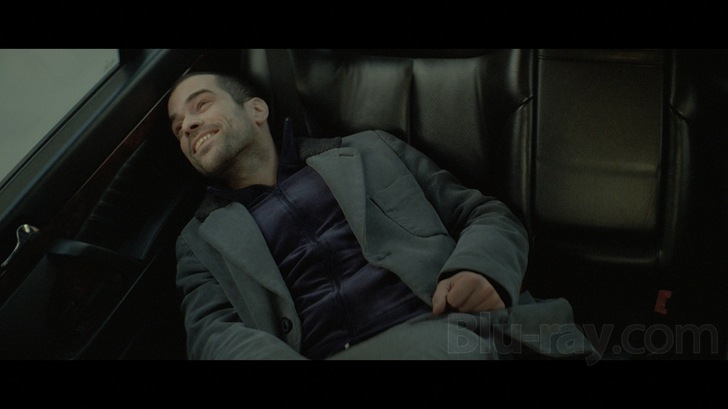
Paris is no undisputed masterpiece—it's long, obsessed with too many characters, and never aims for the profound—but it's as full of life and charm as the city itself. Fans of breezy foreign dramas should take note, and if you've enjoyed any of Klapisch's previous films, you'll find a lot to like here. Buoyed by a solid technical presentation on Blu-ray, Paris is certainly worth at least a rental.
Similar titles
Similar titles you might also like

Let the Sunshine In
Un beau soleil intérieur
2017

Amélie
Le fabuleux destin d'Amélie Poulain
2001

A Woman Is a Woman
Une femme est une femme
1961

Three Colors: White
Trois couleurs: Blanc
1994

Jules and Jim
Jules et Jim
1962

L' Atalante
1934

The Young Girls of Rochefort
Les demoiselles de Rochefort
1967

Children of Paradise
Les enfants du paradis
1945

French Cancan
1955

Betty Blue
37°2 le matin | Director's Cut
1986

The Science of Sleep
2006

Masculin Féminin
1966

Paris, je t'aime
2006

The Earrings of Madame de...
Madame de...
1953

A Day in the Country
Partie de campagne
1946

Pierrot le fou
1965

Three Colors: Red
Trois couleurs: Rouge
1994

The Last Metro
Le dernier métro
1980

The Rules of the Game 4K
La règle du jeu / 1959 Reconstructed Version
1939

Coco Chanel & Igor Stravinsky
2009